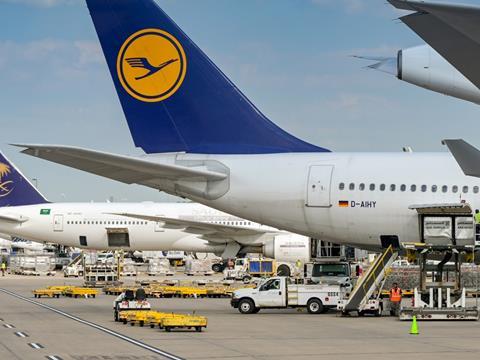
WasteAid and Lufthansa Group have launched a new partnership that will aim to reduce the amount of packaging waste generated on its flights that ultimately ends up in landfill.
Flights arriving at Mumbai airport will be the primary focus of the project, which will attempt to find ways to increase the circularity and recycling rates of packs that make their way into the airport.
WasteAid says that roughly 15,000 kilograms of potential recyclables are generated every year at Mumbai airport from Lufthansa Group flights alone – with around 80 flights and 20,000 passengers arriving every month.
The two organisations, alongside local catering companies and recycling businesses, will initially map out current processes at the airport to determine what Lufthansa can do to improve the circularity of the packs used on its flights.
The ultimate goal is to pilot schemes that will keep in-flight items in the circular economy and keep finite resources within a closed loop for as long as possible.
Manuel Henle, sustainability onboard and lounges at Lufthansa Group, comments: “Our ambition is to only have items onboard that can be reused, recycled, or composted after flights. We have already implemented several initiatives to replace single-use plastics and aluminium on our flights, but recognise that there is more to do. Recycling is a major step towards not wasting finite resources.”
Henle continues: “Projects such as our partnership with WasteAid in Mumbai are a crucial step on our flight path to making our ambition a reality. We’re looking forward to working with the WasteAid team and our stakeholders to identify steps that we can take to increase waste recycling while also creating opportunities to support the local green economy.”
Ceris Turner-Bailes, CEO at WasteAid, adds: “The global airline industry is one of the largest emitters of greenhouse gas emissions on the planet, so we’re really pleased to see Lufthansa Group taking these positive steps to reduce its environmental impact while also creating economic opportunities for local communities.
“By adopting Circular Economy practices, airlines can enhance sustainability, reduce costs, improve efficiency, and authentically improve their green credentials while positively contributing to the environment and local communities.”
WasteAid works with communities around the world who are facing some of the greatest challenges caused by the global waste crisis. Its flagship programmes provide training, mentoring, investment, and collaboration opportunities to deliver sustainable waste management solutions that aim to improve the environment while empowering local communities to leverage the value of waste to their benefit.
In August, Ceris Turner-Bailes told us more about the Kiteezi dumpsite disaster – the tragic collapse of a massive rubbish dump in the capital of Uganda that killed 26 people.
If you liked this story, you might also enjoy:
The ultimate guide to the Packaging and Packaging Waste Regulation in 2024
How are the top brands progressing on packaging sustainability?
Sustainable Innovation Report 2024: Current trends and future priorities
Everything you need to know about global plastic sustainability regulation














No comments yet